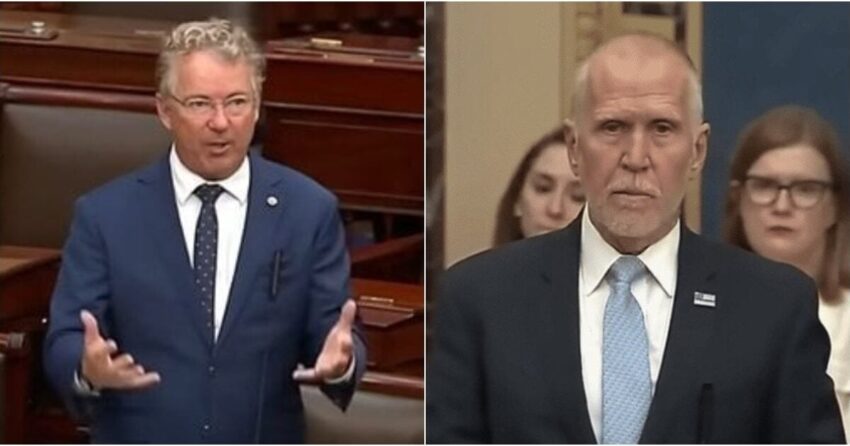
President Donald Trump’s “big, beautiful bill” cleared a critical hurdle Saturday night after the Senate voted largely along party lines to start debate on the sweeping tax and immigration package.
Senators voted 51 to 49 to advance the bill following Republican Sens. Ron Johnson of Wisconsin, Rick Scott of Florida, Mike Lee of Utah, and Cynthia Lummis of Wyoming throwing their support behind the bill. Every Senate Democrat voted “no,” delivering on Senate Majority Leader Chuck Schumer’s pledge that his entire caucus would oppose the president’s domestic policy bill.
Republican Sens. Rand Paul of Kentucky and Thom Tillis of North Carolina voted against the motion to proceed, citing deep substantive concerns with the bill. Senate Majority Leader John Thune held the vote open for more than three hours as Senate GOP leadership and Vice President JD Vance lobbied GOP holdouts to back the measure.
Johnson initially voted against the motion to proceed, arguing the bill needed to incorporate more deficit reduction and that the quick vote did not allow for sufficient debate on the fiscal impacts of the budget package. Senate GOP leadership unveiled revised text shortly before midnight Friday.
The successful vote unlocks up to 20 hours of debate on the Senate proposal before the upper chamber will commence a marathon session of voting known as a “vote-a-rama.” Schumer is also forcing the Senate’s clerks to read the entire 940-page bill before proceeding to debate on the bill, which could delay proceedings by more than half a day.
Senators are expected to vote on a lengthy list of amendments from both Republicans and Democrats seeking a variety of substantive changes to the bill during the “vote-a-rama” before proceeding to a vote on final passage of the bill. before senators vote on the legislation’s final passage.
Republican Utah Sen. Mike Lee, one of the GOP holdouts who ultimately voted “yes,” withdrew his controversial public lands sale proposal after his colleague, Republican Montana Sen. Tim Sheehy, threatened to file an amendment to strip the provision from the bill. Sheehy and his fellow Montanan, Republican Sen. Steve Daines, vigorously opposed the sale of any federal lands despite the proposal exempting Montana.
Lee said he would work with the president to make certain federal lands eligible for housing instead.
Congressional Republicans are using the so-called budget reconciliation process to steer around Democrats’ opposition by passing the president’s landmark bill by a simple majority vote. The sweeping bill incorporates a permanent extension of the expiring provisions of the 2017 Trump tax cuts, shields certain Americans from temporary taxation on tipped wages and overtime pay, devotes hundreds of billions in new funding for immigration enforcement and defense priorities, and slashes government spending by at least $150 billion annually.
“Fifty-three members will never agree on every detail of legislation, let’s face it,” Thune said on the Senate floor prior to the vote.
Though every GOP senator was broadly supportive of the bill’s big-picture items, multiple sticking points kept several from voting to advance the legislation.
Tillis, who is one of the most vulnerable Republicans up for reelection in 2026, told reporters earlier on Saturday that he would vote “no” on the motion to proceed and the vote on final passage, citing the bill’s aggressive reforms to Medicaid.
The North Carolina Republican has previously warned that the Senate’s proposal to reduce caps on Medicaid provider taxes for states that expanded coverage under the Affordable Care Act would jeopardize North Carolina’s access to tens of billions of federal Medicaid funding. Tillis argues this would result in hundreds of thousands of his constituents potentially losing coverage and hopes to keep negotiating with congressional leadership and the White House to amend the text.
“This would force the state to make painful decisions like eliminating Medicaid coverage for hundreds of thousands in the expansion population, and even reducing critical services in the traditional Medicaid population,” Tillis said in a statement prior to the vote.
Thune, however, has argued for the need to crack down on provider taxes, a financing mechanism that allows states to receive additional federal Medicaid funding.
Paul voted against the motion to proceed, citing the inclusion of a $5 trillion hike in the debt ceiling within the Senate’s proposal. The Kentucky Republican has long maintained that he would vote against any legislation that would provide for the federal government to continue borrowing trillions of dollars.
Republican Missouri Sen. Josh Hawley, who was viewed as a potential GOP holdout, announced Saturday that he would vote “yes” during the procedural vote and during final passage of the bill. He cited the delayed implementation of the Medicaid provider tax crackdown and a new rural hospital fund seeking to shore up hospitals that would potentially lose Medicaid funds as his reasons for supporting the legislation.
All republished articles must include our logo, our reporter’s byline, and their DCNF affiliation. For any questions about our guidelines or partnering with us, please contact [email protected].
Click this link for the original source of this article.
Author: Adam Pack
This content is courtesy of, and owned and copyrighted by, https://www.bizpacreview.com and its author. This content is made available by use of the public RSS feed offered by the host site and is used for educational purposes only. If you are the author or represent the host site and would like this content removed now and in the future, please contact USSANews.com using the email address in the Contact page found in the website menu.








